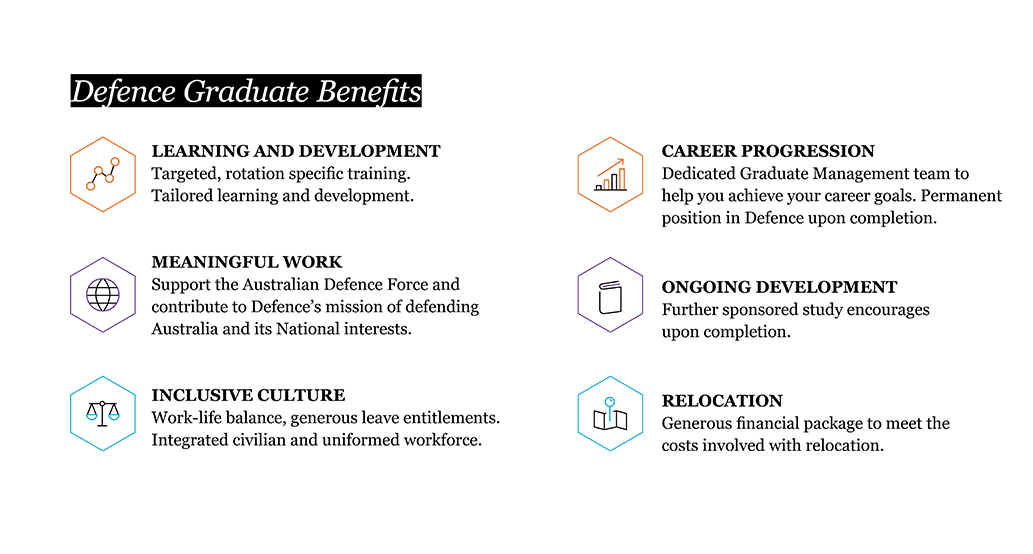Department of Defence
Defence Graduate Program – Australian Geospatial-Intelligence Organisation (AGO)
Opportunity expired
Opportunity details
- Graduate Job or Program
- $68,442 pa + 15.4% superannuation. Upon successful completion of the program, graduates will advance to APS 4: $76,215 pa + 15.4% superannuation.
- Apply by 18 Apr 2020

AGO's intelligence officers also work on a distinctive technical focus. As the exploitation of imagery is a key AGO activity, they place great importance on maintaining and developing their capability to use new technologies in areas such as remote sensing. Their intelligence officers liaise closely with Defence Science and Technology Group, national research organisations, academia and industry to help AGO make the most of emerging technologies.
AGO's intelligence officers have a wide variety of specialist skills and knowledge including geographic information systems (GIS), information technology (IT), scripting and applications development, web services, design and functionality, database management and analysis and remote sensing in several disciplines, including radar, spectral and infrared. Their intelligence officers research and apply advanced techniques, and develop and transition valuable technology into operational applications or provide high-end technical support to analysts.
AGO also has several large-scale Defence projects that must be delivered over the next few years. In 2016, the Australian Government announced funding for space-related capabilities in the 2016 Defence White Paper. AGO is the lead agency for the DEF799 project to build the ground infrastructure to provide Australia with direct and timely access to commercial imaging satellites and deliver Defence's geospatial intelligence space-based capabilities over the next 30 years.
In order for AGO to deliver valued scientific and technical advice and building on these future capabilities, there is a need for a highly-skilled science, technology, engineering and mathematics workforce now and into the future.
A day in the life of an AGO intelligence officer
- AGO work on a variety of interesting and stimulating team-based activities including:
- Working on short and long term intelligence tasks within professional, dedicated and enthusiastic teams.
- Researching and answering high-level intelligence questions and providing geospatial intelligence to Australian Government customers and others.
- Supporting the Australian Defence Force as an integral partner in its programs and operations.
- Liaising and working in collaboration with other Defence Intelligence agencies, as well as broader National Intelligence agencies, to fulfil the Australian Government's intelligence needs.
- Undertaking continuous tradecraft training and professional development to enhance skills and expertise.
- Representing AGO at a variety of conferences and events in Australia and internationally.
- Undertaking further tertiary study aligned with the work of the organisation.
- Representing AGO on an overseas posting.
Quick Details
Salary: $68,442 pa + 15.4% superannuation. Upon successful completion of the program, graduates will advance to APS 4: $76,215 pa + 15.4% superannuation.
Program: 12 months - 3 x 4 month rotations
Eligibility: Australian Citizens only
Location: Canberra (interstate rotations outside of Canberra are available)
Reviews
They are different every day but I have had the opportunity to draft emails, documents and undertake academic research as part of developing doctrinal policy.
- Document review, editing and drafting. - Handling correspondence for projects - Attending meetings - Stakeholder engagement (both internal and external)
Policy writing, decision making, liaising with other areas of Department . These roles and responsibilities are very rewarding
About the employer

Department of Defence
4.1
1,000 - 50,000 employees
Government & Public Service
Bring your unique skills and experiences to a world of opportunity at Defence.
Pros and cons of working at Department of Defence
Pros
Opportunity to learn and exposure to a vast array of experiences. Sense of pride in working on behalf of the Australian people and for the defence of the country.
The support for learning development opportunities and ongoing exposure to networking opportunities.
The department is very flexible when it comes to hours, including making ample arrangements to work from home if necessary.
I have had the opportunity to draft emails, documents and undertake academic research as part of developing doctrinal policy.
They are supportive and are good mentors in teaching the internal procedures that otherwise would not be shared if not directly exposed to them.
Cons
Workplace culture is heavily dependent on the dedication of the supervisors and senior leaders which varies depending on the work area.
When all workplace employees are working on-site there is often a shortage of desks which is inconvenient for all involved.
Can be very slow to hear updates.
There is a good mix of women, ethnic minorities, etc., but this seems to be very aggregated in certain groups/services—not so much integrated or dispersed across the department.
I am unsure of my current knowledge or capacity to comment on their sustainability efforts.